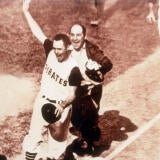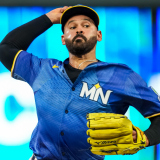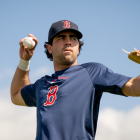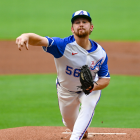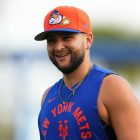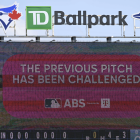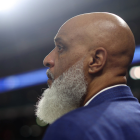Orioles' Jackson Holliday on trade block? Three reasons why it's highly unlikely, and one reason for rumors
GM Mike Elias was asked about the possibility on Thursday
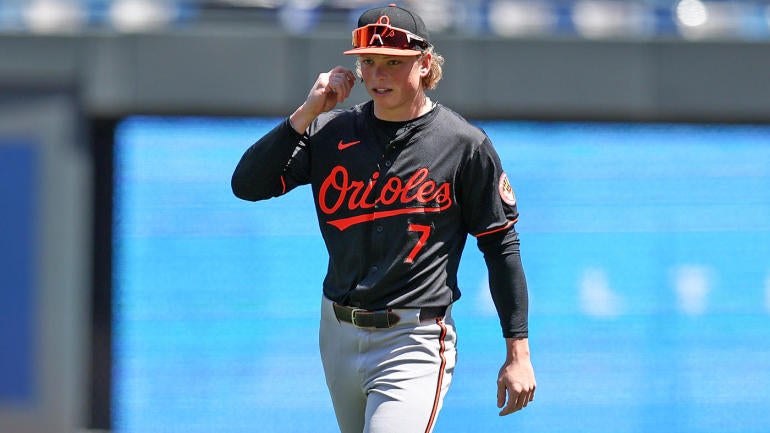
Baltimore Orioles minor-league infielder Jackson Holliday, CBS Sports' No. 1 prospect entering the spring, has had an eventful year. He started the season in the minors after narrowly missing the Opening Day roster, reached the majors before Tax Day, suffered through a poor 10-game stretch that resulted in a demotion, and, most recently, missed two weeks because of right elbow inflammation. That's a full season of developments for most players, all packed into three months.
Holliday's year could be on the cusp of getting weirder. On Thursday, Orioles general manager Mike Elias made an appearance on the Norfolk Tides broadcast -- that is, the Triple-A affiliate of the Orioles. Elias was asked a hypothetical question designed to gauge the possibility of a Holliday trade by this deadline. "It's a tough one to trade," Elias said, according to MASN's Melanie Newman. "He's the No. 1 prospect in minor league baseball. This is a hard talent to get your hands on. We have him, we've been developing him, and we've got very high hopes for him. He's exceptionally far ahead of anyone in his age group, so it's not something we're going to be eager to explore."
To recap: Elias went from being asked, "When will Holliday debut?" to "Would you trade Holliday?" in three months' time. That's not the standard arc for the game's top prospect. Different people will have different interpretations of Elias' answer. For some, there's an implicit "no" in his words. For others, the lack of an explicit "no" is notable. Of course, if Elias had said "no," even that would have been scrutinized as posturing. (We refer to the trade deadline as a "mad season" for a reason.)
With all that in mind, we figured it would be worthwhile to lay out three reasons why a Holliday trade is highly unlikely -- this deadline or anytime soon. We've also offered one reason why it shouldn't be a surprise if Holliday's name does come up in trade talks.
Let's get to it, beginning with why a Holliday trade is highly unlikely.
1. It would be an overreaction
The easiest mistake to make in baseball analysis is overreacting to a small sample size. There's a difference between being stubborn and being unmoored, between being nimble and being foolhardy. The introduction of ball-tracking data has made it easier to fall on the wrong side by granting us a greater degree of confidence in certain samples than their actual predictive value demands.
There's no denying it: Holliday had a bad 10-game stretch in the majors. He went 2 for 34 with 18 strikeouts and two walks. He had an average exit velocity of around 87 mph, and he whiffed on nearly half of his swings. None of that is good. That level of underperformance was jarring and unexpected, to the extent that we can understand anyone who questioned their priors on Holliday. At the end of the day, though, it's important to remember that it was 10 games. That's a week and a half, a homestand, three series. If you've ever clicked around on stats leaderboards early in the season, you know some funky things can happen in short order. That's baseball for you.
102.8 mph off the bat for Jackson Holliday.
— MLB Pipeline (@MLBPipeline) June 26, 2024
And with a pair of walks Tuesday, he has 16 BB in his past 13 Triple-A @NorfolkTides outings. https://t.co/6LdHLiDv0i pic.twitter.com/diKNL72Lta
Gunnar Henderson won last season's Rookie of the Year Award (in time he might win this season's American League Most Valuable Player Award), and because of that, no one remembers how he opened 2023 with a 10-game stretch that saw him go 5 for 34 with 17 strikeouts. It doesn't stop there, either. Bear with us: we're about to engage in some deliciously selective endpoints. Henderson, who entered 2023 ranked as our No. 1 prospect, was sporting a career .218/.345/.380 slash line through his first 67 big-league games. Elsewhere on the Orioles roster, catcher Adley Rutschman was hitting .210/.296/.389 with twice as many strikeouts as walks through his first 44 games. Outfielder Colton Cowser had a .433 OPS in 26 games last season. And so on and so forth.
The Orioles didn't bail on any of those three. In turn, each might make this summer's All-Star Game. Why, then, would they be so quick to hit the eject button on Holliday, a much younger and perhaps highly touted player? Even if you don't accept that argument, there's more context that's worth considering.
Bear in mind, Holliday is extremely young -- he won't turn 21 until December -- with an impressive (and extensive) track record of hitting older pitchers. His environment matters, too. Holliday was attempting to make the leap to The Show at an odd time for the minor leagues. Several front-office types have expressed frustration to CBS Sports throughout this season about the state of the minors (particularly the highest and lowest levels) following the recent reorganization. It stands to reason that no player, even one as talented as Holliday, is immune to those effects.
So, there were valid reasons for Holliday to scuffle. And, even if there weren't, it doesn't mean we should rush to rash conclusions after 10 games, a proverbial drip in the information bucket.
2. It wouldn't fit the Orioles' philosophy
We should grant some country to those who view a Holliday trade not as a reaction to his struggles, but as a reaction to the Orioles' roster complexion. Those individuals -- and we assume a few of them do exist -- have likely wanted Baltimore to pursue a Holliday trade dating back to last winter.
We understand how one could look at the Orioles' depth chart, overbrimming with productive infielders, and conclude that Baltimore doesn't necessarily need Holliday, and how their World Series hopes would be improved by moving him for another frontline starter to steady an injury-ravaged rotation. After all, they have the young pair of Henderson and Jordan Westburg on the left side of the infield, as well as Jorge Mateo and Ryan Mountcastle to man the right side -- and that's without considering Triple-A infielder Coby Mayo, who ought to make his own debut over the coming weeks. Nevertheless, we don't think trading Holliday jibes with their organizational MO.
It's not just that the Orioles have been reluctant to trade any talented young position player -- it felt like an earth-shaking matter when they agreed to ship out Joey Ortiz in the spring, and not only was Ortiz buried on the depth chart, but that deal fetched them an ace in Corbin Burnes -- it's that they seem reluctant to burn resources on their pitching staff. Consider their draft history. Since Elias took over in November 2018, the Orioles have made 21 selections in the first, second, and third rounds. Three of those have been pitchers, and none earlier than the second round. (And that exception, Jackson Baumeister last summer, was their second pick of the round.)
The Orioles seem more content, and arguably more confident in their ability to get more mileage from unheralded pro arms than anyone (ourselves included) may find commendable or enjoyable. Even if that isn't true, something else is: they've been vindicated by a pitching staff that ranks third in ERA this season and that checked in at seventh in ERA last season.
3. The market isn't there
Let's conclude this section by taking a different perspective on the Holliday trade idea. Say the Orioles were serious about moving him -- who would they trade him for?
About a month out from the deadline, this doesn't look like a good buyer's market. The muddled state of the National League wild-card race means there are about a handful of surefire sellers. Few of them have the kind of player the Orioles would want in return for such a promising young talent. You can argue for Luis Robert Jr., or Garrett Crochet, or whomever -- we're not knocking them as players, but we're unconvinced they'd merit Holliday because of their durability concerns.
JACKSON HOLLIDAY HOMERS IN HIS 1ST AT-BAT OF THE YEAR!@Orioles | @OsPlayerDev pic.twitter.com/iCFE37qo6r
— MLB Pipeline (@MLBPipeline) March 29, 2024
Now, you can argue that dangling Holliday would open more doors by convincing some fringe contenders to change their approaches or unlock some surprising names in negotiations. There's probably some truth to that, but it also feels like a cop out. There probably are players who it would make sense for the Orioles to seriously consider in a Holliday trade; we just don't expect him, or them, to be talked about enough that something gets done.
And now, onto the reason Holliday's name could pop up in trade talks.
1. That's the game
Here's the reality of pro sports: there's no such thing as an untouchable, and there's certainly no such thing as an untalkable.
Every player gets discussed at some point -- yes, even your favorite young star. It may seem pointless for a team to ring, say, the Kansas City Royals and ask about, say, Bobby Witt Jr.'s availability … yet that's exactly what happened last winter before the Royals signed Witt to an extension. If you're fortunate enough to talk to honest front-office members for long enough, you'll hear about some pie-in-the-sky ideas that never had a hope of realization.
Inquiring about this or that player, no matter the odds of a deal being reached, is a way for teams to glean information -- about how teams are valuing players in relation to their own internal evaluations and about who or what that team could be seeking in other trades. There's a reason why teams obsessively log information about their conversations with other teams: being in a front office means being in the business of information. No matter how farfetched the talks are at any given moment, there's a chance to gain data that could, in time, serve as helpful guideposts.
All that to say: Holliday's name will probably come up in trade talks this summer because it's probably been coming up all along. That doesn't mean the Orioles intend to trade him; it just means the Orioles are doing their due diligence.


